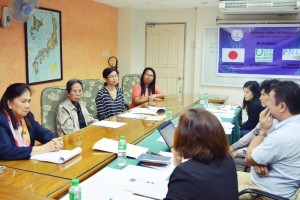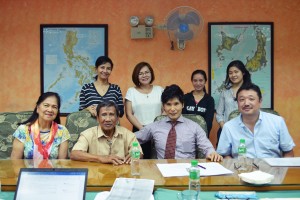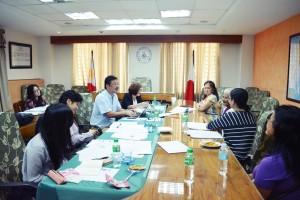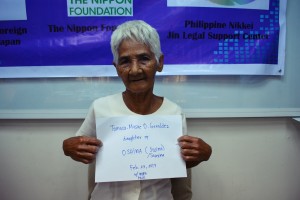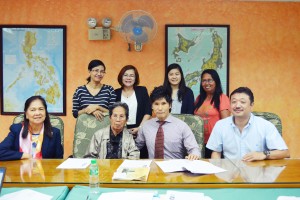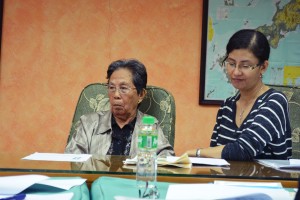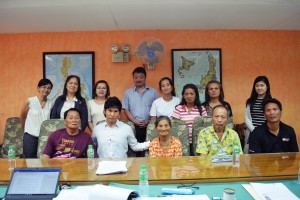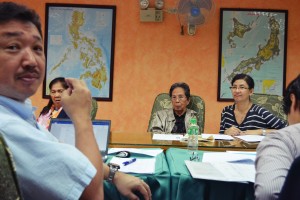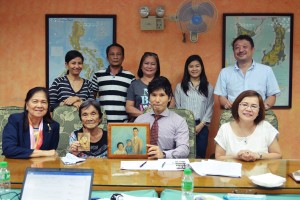Hon . Consul Shiro Furihata of The Ministry of Foreign Affair in coordination with the Philippine Nikkei Jin Kai Legal Support Center headed by Mr. Inomota, Norihiro together with The Nippon Foundation represented by Ms. Ikuko Okubo came to Davao City, purposely to interview members of the Philippine Nikkei Jin Kai, Inc. (PNJK) Davao City Chapter.
This is one project that started last year involving the Ministry of Foreign Affair. In year 2015, Philippine Nikkei Jin Kai Rengokai headed by Mrs. Ines P. Mallari together with members-chapter presented to His Excellency Prime Minister Shinzo Abe documents containing more than 27,000 signatures, whereby an appeal had been interposed to give war-displaced descendants belonging to Category C classification the chance to present proofs evidencing their affiliation with the Japanese national. The Japanese government took notice of the plight of Category C descendants that it consented to take part in conducting interviews to somehow help them secure their own family registration by way of shuseki petition.
With this arrangement, Japanese consuls have been assigned to go to various chapters, meet the descendants that needed assistance, conduct an interview and weigh their evidence presented in order to qualify for shuseki petition. The petition is being handled by Japanese lawyers headed by Atty. Hiroyuki Kawai.
With the presence of Consul Furihata, on February 22, 2017 in the morning, two Category C descendants were interviewed at the PNJK Inc. board room namely:
Ceriaca – Ayako Konno Odoy whose father was from Fukushima, Japan and migrated to Davao, worked as abaca farmer in Tamugan. Allegedly the father joined the Japanese army during the war. Nothing was heard from him thereafter.
Tomasa –Masae Sejima Geraldes. Tomasa known as Masae believed that the surname of her father was Oshima. Per baptismal record her father’s name is Sausima Daguidor. Neighbors said the last name of her father is Sausima Sejima Senichi. The father was killed during the war. These are the only facts so far that the concerned descendant could relay to the screening committee.
In the afternoon of February 22, 2017, Cirilo Kimura was called and this is his story: his father Onna Lundas from Tamayong Bagobo tribe arrived in Calinan in 1929 and engaged in abaca farming. Cirilo Kimura was four years old when the war broke out. They took refuge in Samal and merely heard that his parents were killed.
Another descendant named Alicia chico Kodaira was asked about her background. Her father came to Davao and engaged in abaca farming under Ohta Development Company. Her Japanese father met Hanumaria Boholano. They got married in Cebu in 1935. Two children were born out of this marriage, namely: Hisao and Chiko. During the war the Japanese father was a driver of a Japanese Army while the mother and children left for Bohol. They survived the war and in 2005 they came to Mindanao and sought the assistance of the Philippine Nikkei Jin Kai. With research work coming from PNLSC they found the koseki of kodaira.
On February 23, 2017, two siblings were interviewed, namely: Rosalina Tamae Habuchi and Hitche Habuchi. Before the war the father was working as storekeeper owned by Ohta Development Company in Sta. Cruz. Later, the Japanese father opened a new store in Barangay Maglibas. He met Diola Manga and got married through tribal marriage. Nine (9) children were born. Three children went to Japanese school. During the war three children with the father were captured. The children later were released but the father was shot to death. They ran to the mountains and during peace time they came down and upon hearing the association of nikkeijins they became members. Later the koseki of the father was located with the help of the association.
All descendants who were interviewed are appealing that they be recognized to enable them to see relatives in Japan if still living. Moreover, once they are recognized it is a one legacy that can be left to their children and the young generations to come.

